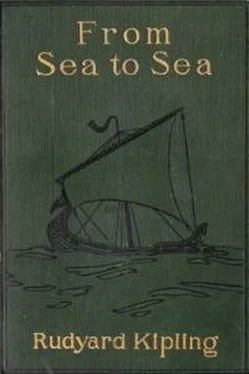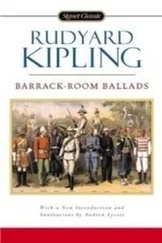Джозеф Киплинг - From Sea to Sea
Здесь есть возможность читать онлайн «Джозеф Киплинг - From Sea to Sea» весь текст электронной книги совершенно бесплатно (целиком полную версию без сокращений). В некоторых случаях можно слушать аудио, скачать через торрент в формате fb2 и присутствует краткое содержание. Год выпуска: 2014, Издательство: epubBooks Classics, Жанр: Биографии и Мемуары, Публицистика, на английском языке. Описание произведения, (предисловие) а так же отзывы посетителей доступны на портале библиотеки ЛибКат.
- Название:From Sea to Sea
- Автор:
- Издательство:epubBooks Classics
- Жанр:
- Год:2014
- ISBN:нет данных
- Рейтинг книги:3 / 5. Голосов: 1
-
Избранное:Добавить в избранное
- Отзывы:
-
Ваша оценка:
- 60
- 1
- 2
- 3
- 4
- 5
From Sea to Sea: краткое содержание, описание и аннотация
Предлагаем к чтению аннотацию, описание, краткое содержание или предисловие (зависит от того, что написал сам автор книги «From Sea to Sea»). Если вы не нашли необходимую информацию о книге — напишите в комментариях, мы постараемся отыскать её.
From Sea to Sea — читать онлайн бесплатно полную книгу (весь текст) целиком
Ниже представлен текст книги, разбитый по страницам. Система сохранения места последней прочитанной страницы, позволяет с удобством читать онлайн бесплатно книгу «From Sea to Sea», без необходимости каждый раз заново искать на чём Вы остановились. Поставьте закладку, и сможете в любой момент перейти на страницу, на которой закончили чтение.
Интервал:
Закладка:
Two tunnels crossing at right angles had been driven through a pillar which in its under–cut condition seemed like the rough draft of a statue for an elephant. "When the pillar stands only on four legs we chip away one leg at a time from a square to an hour–glass shape, and then either the whole of the pillar crashes down from the roof or else a quarter or a half. If the coal lies against the sandstones it carries away clear, but in some places it brings down stone and rubbish with it. The chipped–away legs of the pillars are called stooks."
"Who has to make the last cut that breaks a leg through?"
"Oh! Englishmen of sorts. We can't trust natives for the job unless it's very easy. The natives take kindly to the pillar–work though. They are paid just as much for their coal as though they had hewed it out of the solid. Of course we take very good care to see that the roof doesn't come in on us. You would never understand how and why we prop our roofs with those piles of sleepers. Anyway, you can see that we cannot take out a whole line of pillars. We work 'em en echelon , and those big beams you see running from floor to roof are our indicators. They show when the roof is going to give. Oh! dear no, there's no dramatic effect about it. No splash, you know. Our roofs give plenty of warning by cracking and then collapse slowly. The parts of the work that we have cleared out and allowed to fall in are called goafs. You're on the edge of a goaf now. All that darkness there marks the limit of the mine. We have worked that out piece–meal, and the props are gone and the place is down. The roof of any pillar–working is tested every morning by tapping—pretty hard tapping."
"Hi yi! yi!" shout all the devils in chorus, and the Hall of Eblis is full of rolling sound. The olive man has brought down an avalanche of coal. "It is a sight to see the whole of one of the pillars come away. They make an awful noise. It would startle you out of your wits. But there's not an atom of risk."
("Not an atom of risk." Oh, genial and courteous host, when you turned up next day blacker than any sweep that ever swept, with a neat, half–inch gash on your forehead—won by cutting a "stook" and getting caught by a bounding coal–knob—how long and earnestly did you endeavour to show that "stook–cutting" was an employment as harmless and unexciting as wool–samplering!)
"Our ways are rather primitive, but they're cheap, and safe as houses. Doms and Bauris, Kols and Beldars, don't understand refinements in mining. They'd startle an English pit where there was fire–damp. Do you know it's a solemn fact that if you drop a Davy lamp or snatch it quickly you can blow a whole English pit inside out with all the miners? Good for us that we don't know what fire–damp is here. We can use flare–lamps."
After the first feeling of awe and wonder is worn out, a mine becomes monotonous. There is only the humming, palpitating darkness, the rumble of the tubs, and the endless procession of galleries to arrest the attention. And one pit to the uninitiated is as like to another as two peas. Tell a miner this and he laughs—slowly and softly. To him the pits have each distinct personalities, and each must be dealt with differently.
Chapter III
The Perils of the Pits
An engineer, who has built a bridge, can strike you nearly dead with professional facts; the captain of a seventy–horse–power Ganges river–steamer can, in one hour, tell legends of the Sandheads and the James and Mary shoal sufficient to fill half a Pioneer , but a couple of days spent on, above, and in a coal–mine yields more mixed information than two engineers and three captains. It is hopeless to pretend to understand it all.
When your host says, "Ah, such an one is a thundering good fault–reader!" you smile hazily, and by way of keeping up the conversation, adventure on the statement that fault–reading and palmistry are very popular amusements. Then men explain.
Every one knows that coal–strata, in common with women, horses, and official superiors, have "faults" caused by some colic of the earth in the days when things were settling into their places. A coal–seam is suddenly sliced off as a pencil is cut through with one slanting blow of the penknife, and one–half is either pushed up or pushed down any number of feet. The miners work the seam till they come to this break–off, and then call for an expert to "read the fault." It is sometimes very hard to discover whether the sliced–off seam has gone up or down. Theoretically, the end of the broken piece should show the direction. Practically its indications are not always clear. Then a good "fault–reader," who must more than know geology, is a useful man, and is much prized; for the Giridih fields are full of faults and "dykes." Tongues of what was once molten lava thrust themselves sheer into the coal, and the disgusted miner finds that for about twenty feet on each side of the tongue all coal has been burnt away.
The head of the mine is supposed to foresee these things and more. He can tell you, without looking at the map, what is the geological formation of any thousand square miles of India; he knows as much about brickwork and the building of houses, arches, and shafts as an average P. W. D. man; he has not only to know the intestines of a pumping or winding engine, but must be able to take them to pieces with his own hands, indicate on the spot such parts as need repair, and make drawings of anything that requires renewal; he knows how to lay out and build railways with a grade of one in twenty–seven; he has to carry, in his head all the signals and points between and over which his locomotive engines work; he must be an electrician capable of controlling the apparatus that fires the dynamite charges in the pits, and must thoroughly understand boring operations with thousand–foot drills. He must know by name, at least, one thousand of the men on the works, and must fluently speak the vernaculars of the low castes. If he has Sonthali, which is more elaborate than Greek, so much the better for him. He must know how to handle men of all grades, and, while holding himself aloof, must possess sufficient grip of the men's private lives to be able to see at once the merits of a charge of attempted abduction preferred by a clucking, croaking Kol against a fluent English–speaking Brahmin. For he is literally the Light of Justice, and to him the injured husband and the wrathful father look for redress. He must be on the spot and take all responsibility when any specially risky job is under way in the pit, and he can claim no single hour of the day or the night for his own. From eight in the morning till one in the afternoon he is coated with coal–dust and oil. From one till eight in the evening he has office work. After eight o'clock he is free to attend to anything that he may be wanted for.
This is a soberly drawn picture of a life that Sahibs on the mines actually enjoy. They are spared all private socio–official worry, for the Company, in its mixture of State and private interest, is as perfectly cold–blooded and devoid of bias as any great Department of the Empire. If certain things be done, well and good. If certain things be not done the defaulter goes, and his place is filled by another. The conditions of service are graven on stone. There may be generosity; there undoubtedly is justice, but above all, there is freedom within broad limits. No irrepressible shareholder cripples the executive arm with suggestions and restrictions, and no private piques turn men's blood to gall within them. They work like horses and are happy.
When he can snatch a free hour, the grimy, sweating, cardigan–jacketed, ammunition–booted, pick–bearing ruffian turns into a well–kept English gentleman, who plays a good game of billiards, and has a batch of new books from England every week. The change is sudden, but in Giridih nothing is startling. It is right and natural that a man should be alternately Valentine and Orson, specially Orson. It is right and natural to drive—always behind a mad horse—away and away towards the lonely hills till the flaming coke ovens become glow–worms on the dark horizon, and in the wilderness to find a lovely English maiden teaching squat, filthy Sonthal girls how to become Christians. Nothing is strange in Giridih, and the stories of the pits, the raffle of conversation that a man picks up as he passes, are quite in keeping with the place. Thanks to the law, which enacts that an Englishman must look after the native miners, and if any one be killed must explain satisfactorily that the accident was not due to preventable causes, the death–roll is kept astoundingly low. In one "bad" half–year, six men out of the five thousand were killed, in another four, and in another none at all. As has been said before, a big accident would scare off the workers, for, in spite of the age of the mines—nearly thirty years—the hereditary pitman has not yet been evolved. But to small accidents the men are orientally apathetic. Read of a death among the five thousand:—
Читать дальшеИнтервал:
Закладка:
Похожие книги на «From Sea to Sea»
Представляем Вашему вниманию похожие книги на «From Sea to Sea» списком для выбора. Мы отобрали схожую по названию и смыслу литературу в надежде предоставить читателям больше вариантов отыскать новые, интересные, ещё непрочитанные произведения.
Обсуждение, отзывы о книге «From Sea to Sea» и просто собственные мнения читателей. Оставьте ваши комментарии, напишите, что Вы думаете о произведении, его смысле или главных героях. Укажите что конкретно понравилось, а что нет, и почему Вы так считаете.












